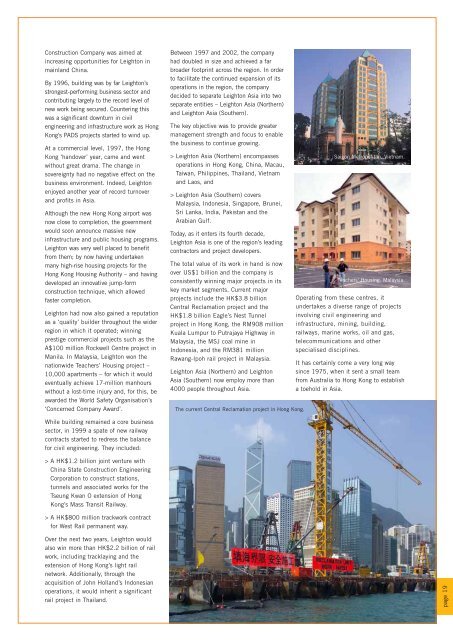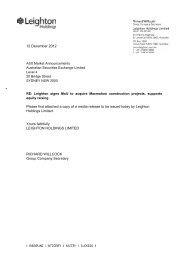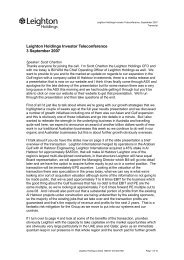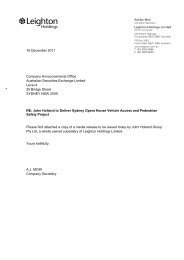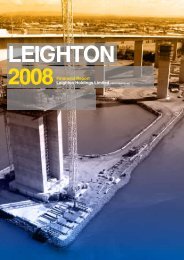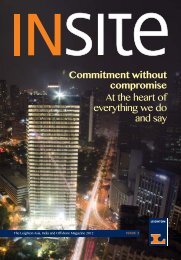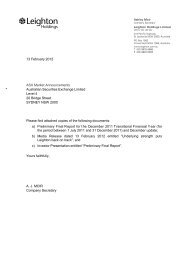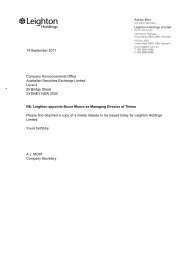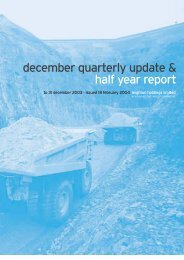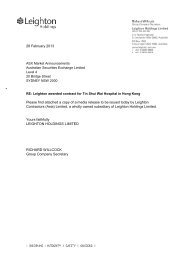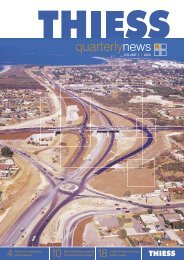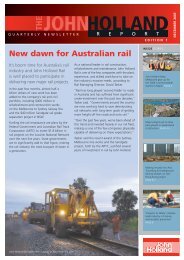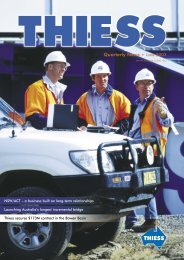Leighton Asia News, July 2005 - Leighton Holdings
Leighton Asia News, July 2005 - Leighton Holdings
Leighton Asia News, July 2005 - Leighton Holdings
You also want an ePaper? Increase the reach of your titles
YUMPU automatically turns print PDFs into web optimized ePapers that Google loves.
Construction Company was aimed at<br />
increasing opportunities for <strong>Leighton</strong> in<br />
mainland China.<br />
By 1996, building was by far <strong>Leighton</strong>’s<br />
strongest-performing business sector and<br />
contributing largely to the record level of<br />
new work being secured. Countering this<br />
was a significant downturn in civil<br />
engineering and infrastructure work as Hong<br />
Kong’s PADS projects started to wind up.<br />
At a commercial level, 1997, the Hong<br />
Kong ‘handover’ year, came and went<br />
without great drama. The change in<br />
sovereignty had no negative effect on the<br />
business environment. Indeed, <strong>Leighton</strong><br />
enjoyed another year of record turnover<br />
and profits in <strong>Asia</strong>.<br />
Although the new Hong Kong airport was<br />
now close to completion, the government<br />
would soon announce massive new<br />
infrastructure and public housing programs.<br />
<strong>Leighton</strong> was very well placed to benefit<br />
from them; by now having undertaken<br />
many high-rise housing projects for the<br />
Hong Kong Housing Authority – and having<br />
developed an innovative jump-form<br />
construction technique, which allowed<br />
faster completion.<br />
<strong>Leighton</strong> had now also gained a reputation<br />
as a ‘quality’ builder throughout the wider<br />
region in which it operated; winning<br />
prestige commercial projects such as the<br />
A$100 million Rockwell Centre project in<br />
Manila. In Malaysia, <strong>Leighton</strong> won the<br />
nationwide Teachers’ Housing project –<br />
10,000 apartments – for which it would<br />
eventually achieve 17-million manhours<br />
without a lost-time injury and, for this, be<br />
awarded the World Safety Organisation’s<br />
‘Concerned Company Award’.<br />
Between 1997 and 2002, the company<br />
had doubled in size and achieved a far<br />
broader footprint across the region. In order<br />
to facilitate the continued expansion of its<br />
operations in the region, the company<br />
decided to separate <strong>Leighton</strong> <strong>Asia</strong> into two<br />
separate entities – <strong>Leighton</strong> <strong>Asia</strong> (Northern)<br />
and <strong>Leighton</strong> <strong>Asia</strong> (Southern).<br />
The key objective was to provide greater<br />
management strength and focus to enable<br />
the business to continue growing.<br />
> <strong>Leighton</strong> <strong>Asia</strong> (Northern) encompasses<br />
operations in Hong Kong, China, Macau,<br />
Taiwan, Philippines, Thailand, Vietnam<br />
and Laos, and<br />
> <strong>Leighton</strong> <strong>Asia</strong> (Southern) covers<br />
Malaysia, Indonesia, Singapore, Brunei,<br />
Sri Lanka, India, Pakistan and the<br />
Arabian Gulf.<br />
Today, as it enters its fourth decade,<br />
<strong>Leighton</strong> <strong>Asia</strong> is one of the region’s leading<br />
contractors and project developers.<br />
The total value of its work in hand is now<br />
over US$1 billion and the company is<br />
consistently winning major projects in its<br />
key market segments. Current major<br />
projects include the HK$3.8 billion<br />
Central Reclamation project and the<br />
HK$1.8 billion Eagle’s Nest Tunnel<br />
project in Hong Kong, the RM908 million<br />
Kuala Lumpur to Putrajaya Highway in<br />
Malaysia, the MSJ coal mine in<br />
Indonesia, and the RM381 million<br />
Rawang-Ipoh rail project in Malaysia.<br />
<strong>Leighton</strong> <strong>Asia</strong> (Northern) and <strong>Leighton</strong><br />
<strong>Asia</strong> (Southern) now employ more than<br />
4000 people throughout <strong>Asia</strong>.<br />
The current Central Reclamation project in Hong Kong.<br />
Saigon Metropolitan, Vietnam.<br />
Teachers' Housing, Malaysia.<br />
Operating from these centres, it<br />
undertakes a diverse range of projects<br />
involving civil engineering and<br />
infrastructure, mining, building,<br />
railways, marine works, oil and gas,<br />
telecommunications and other<br />
specialised disciplines.<br />
It has certainly come a very long way<br />
since 1975, when it sent a small team<br />
from Australia to Hong Kong to establish<br />
a toehold in <strong>Asia</strong>.<br />
While building remained a core business<br />
sector, in 1999 a spate of new railway<br />
contracts started to redress the balance<br />
for civil engineering. They included:<br />
> A HK$1.2 billion joint venture with<br />
China State Construction Engineering<br />
Corporation to construct stations,<br />
tunnels and associated works for the<br />
Tseung Kwan O extension of Hong<br />
Kong’s Mass Transit Railway.<br />
> A HK$800 million trackwork contract<br />
for West Rail permanent way.<br />
Over the next two years, <strong>Leighton</strong> would<br />
also win more than HK$2.2 billion of rail<br />
work, including tracklaying and the<br />
extension of Hong Kong’s light rail<br />
network. Additionally, through the<br />
acquisition of John Holland’s Indonesian<br />
operations, it would inherit a significant<br />
rail project in Thailand.<br />
page 19


